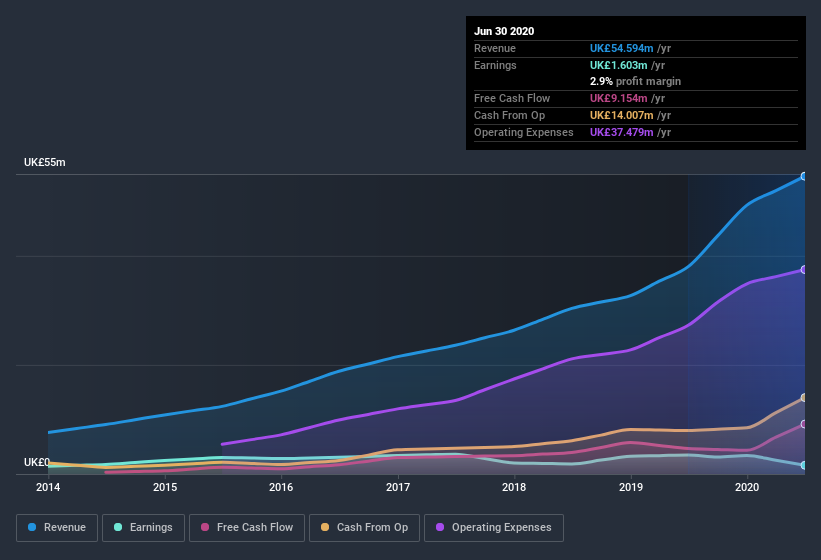- United Kingdom
- /
- Commercial Services
- /
- AIM:INSE
We're Not Counting On Inspired Energy (LON:INSE) To Sustain Its Statutory Profitability

Broadly speaking, profitable businesses are less risky than unprofitable ones. That said, the current statutory profit is not always a good guide to a company's underlying profitability. Today we'll focus on whether this year's statutory profits are a good guide to understanding Inspired Energy (LON:INSE).
While Inspired Energy was able to generate revenue of UK£54.6m in the last twelve months, we think its profit result of UK£1.60m was more important. As you can see in the chart below, its profit has declined over the last three years, even though its revenue has increased.
View our latest analysis for Inspired Energy

Of course, it is only sensible to look beyond the statutory profits and question how well those numbers represent the sustainable earnings power of the business. In this article we'll look at how Inspired Energy is impacting shareholders by issuing new shares. That might leave you wondering what analysts are forecasting in terms of future profitability. Luckily, you can click here to see an interactive graph depicting future profitability, based on their estimates.
To understand the value of a company's earnings growth, it is imperative to consider any dilution of shareholders' interests. Inspired Energy expanded the number of shares on issue by 35% over the last year. As a result, its net income is now split between a greater number of shares. To celebrate net income while ignoring dilution is like rejoicing because you have a single slice of a larger pizza, but ignoring the fact that the pizza is now cut into many more slices. You can see a chart of Inspired Energy's EPS by clicking here.
A Look At The Impact Of Inspired Energy's Dilution on Its Earnings Per Share (EPS).
Unfortunately, Inspired Energy's profit is down 56% per year over three years. And even focusing only on the last twelve months, we see profit is down 54%. Sadly, earnings per share fell further, down a full 58% in that time. So you can see that the dilution has had a fairly significant impact on shareholders.
In the long term, if Inspired Energy's earnings per share can increase, then the share price should too. But on the other hand, we'd be far less excited to learn profit (but not EPS) was improving. For that reason, you could say that EPS is more important that net income in the long run, assuming the goal is to assess whether a company's share price might grow.
Our Take On Inspired Energy's Profit Performance
Inspired Energy issued shares during the year, and that means its EPS performance lags its net income growth. For this reason, we think that Inspired Energy's statutory profits may be a bad guide to its underlying earnings power, and might give investors an overly positive impression of the company. In further bad news, its earnings per share decreased in the last year. Of course, we've only just scratched the surface when it comes to analysing its earnings; one could also consider margins, forecast growth, and return on investment, among other factors. With this in mind, we wouldn't consider investing in a stock unless we had a thorough understanding of the risks. To that end, you should learn about the 3 warning signs we've spotted with Inspired Energy (including 1 which makes us a bit uncomfortable).
This note has only looked at a single factor that sheds light on the nature of Inspired Energy's profit. But there are plenty of other ways to inform your opinion of a company. Some people consider a high return on equity to be a good sign of a quality business. While it might take a little research on your behalf, you may find this free collection of companies boasting high return on equity, or this list of stocks that insiders are buying to be useful.
When trading Inspired Energy or any other investment, use the platform considered by many to be the Professional's Gateway to the Worlds Market, Interactive Brokers. You get the lowest-cost* trading on stocks, options, futures, forex, bonds and funds worldwide from a single integrated account. Promoted
If you're looking to trade Inspired, open an account with the lowest-cost platform trusted by professionals, Interactive Brokers.
With clients in over 200 countries and territories, and access to 160 markets, IBKR lets you trade stocks, options, futures, forex, bonds and funds from a single integrated account.
Enjoy no hidden fees, no account minimums, and FX conversion rates as low as 0.03%, far better than what most brokers offer.
Sponsored ContentNew: AI Stock Screener & Alerts
Our new AI Stock Screener scans the market every day to uncover opportunities.
• Dividend Powerhouses (3%+ Yield)
• Undervalued Small Caps with Insider Buying
• High growth Tech and AI Companies
Or build your own from over 50 metrics.
This article by Simply Wall St is general in nature. It does not constitute a recommendation to buy or sell any stock, and does not take account of your objectives, or your financial situation. We aim to bring you long-term focused analysis driven by fundamental data. Note that our analysis may not factor in the latest price-sensitive company announcements or qualitative material. Simply Wall St has no position in any stocks mentioned.
*Interactive Brokers Rated Lowest Cost Broker by StockBrokers.com Annual Online Review 2020
Have feedback on this article? Concerned about the content? Get in touch with us directly. Alternatively, email editorial-team@simplywallst.com.
About AIM:INSE
Inspired
Provides energy consultancy services to corporate business energy users in the United Kingdom and Ireland.
Undervalued with reasonable growth potential.
Market Insights
Community Narratives


